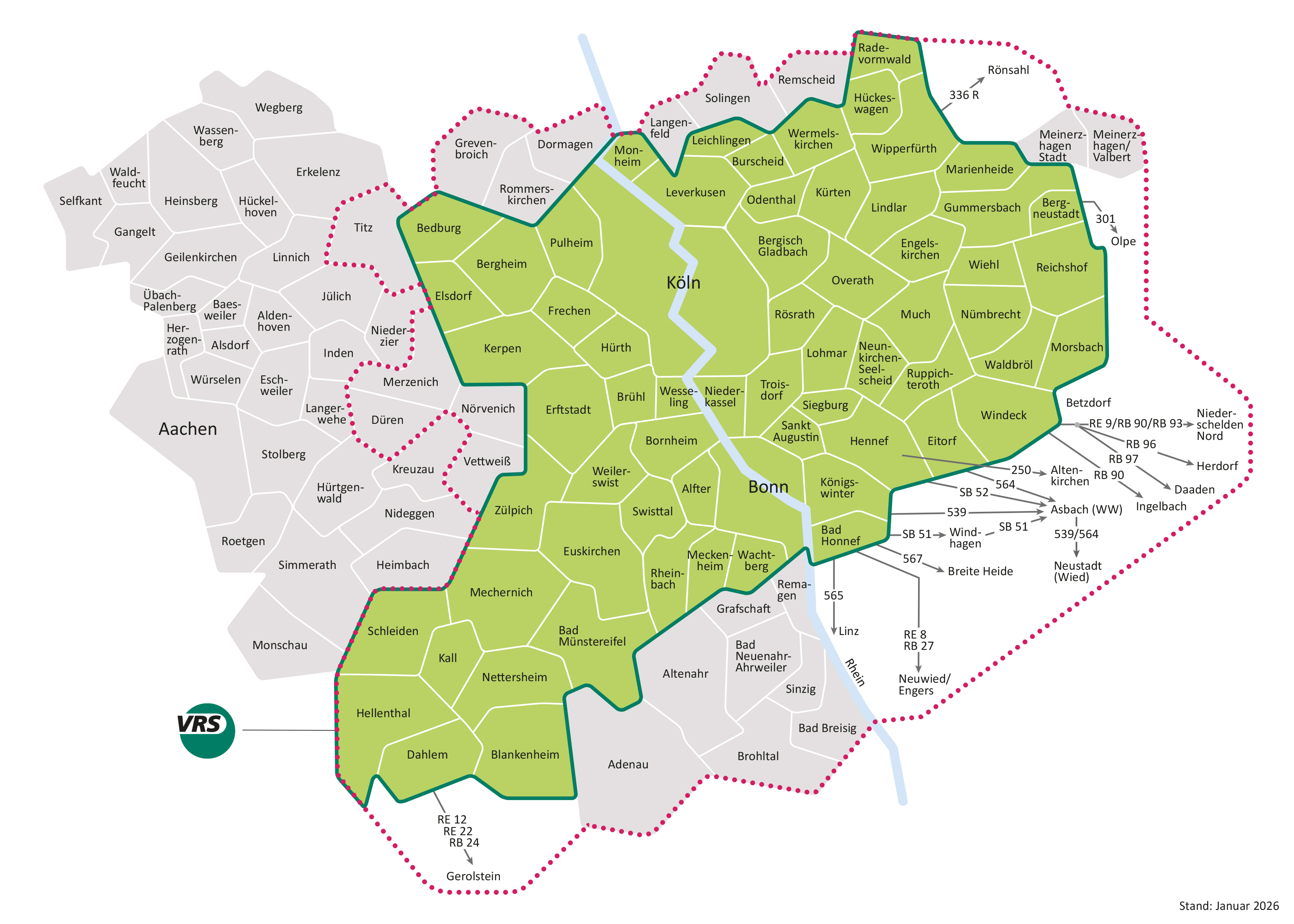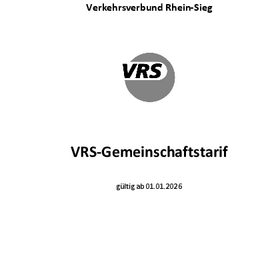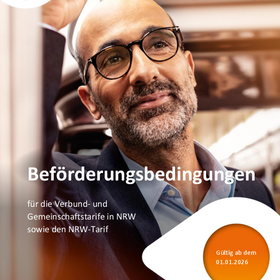
Tariff regulations
The rules and regulations of the VRS joint tariff.

You can find out which tickets are available to buy in the VRS and which rules apply when using public transport in the VRS in the VRS community tariff and in the NRW-wide NRW conditions of carriage.
Here you can travel with VRS tickets:

Legend
- green area: VRS network area
- red dotted area: VRS network
- Overall map: VRS fare zone
Questions about fares and their increases
-
-
Updating, i.e. increasing fares, is unpopular, but it has to be done. After all, public transport means performance and transport companies incur costs for this: for traction current, fuel, staff salaries, materials and maintenance of vehicles and facilities or for investments.
These costs increase from year to year. In order to be able to maintain transport services and invest, it is necessary to absorb the higher costs.
A reliable forecast of fare revenues and a regulated procedure mean planning security for transport companies, especially for companies that have to calculate years in advance in a competitive environment.
-
-
A suspension of fare increases is only feasible if the missing funds are compensated for from other sources.
This is because the VRS and the transport companies only have two levers at their disposal to offset the rising costs: the fares and the transport services.
Transport companies have already largely exhausted the possibilities for rationalization and cost savings in recent years. In addition, the overarching goals of a transport turnaround and climate protection cannot be achieved by cutting public transport services.
There are repeated calls for fare increases to be waived or fares to be reduced. The reasons for this are usually understandable and, in fact, user financing is reaching its limits.
However, everyone must be clear in the discussion: Anyone calling for a fare freeze must also be able to say how this is to be financed. The problem can only be solved if the fundamental structure of public transport funding is changed.
At this point, however, it is not the VRS and the transport companies that are called upon, but the legislator, first and foremost the federal government.
-
-
The desire for cheaper tickets is understandable, as people's mobility costs are rising, regardless of whether they travel by public transport or by car.
The VRS already offers reasonably priced tickets. Well below the price of monthly season tickets are the JobTicket/Bulk CustomerTicket or the Deutschlandticket.
Occasional customers receive a discount when purchasing VRS tickets as a HandyTicket or OnlineTicket. The AzubiTicket is also an inexpensive way for young people to be mobile around the clock.
The VRS generally offers "flat fare" products for all age groups, which are not only valid throughout the network, but also 365 days a year.
-
-
Experience has shown that a good service with frequent intervals, long service times, close connections and modern vehicles as well as good quality in operation are the most important criteria when it comes to attracting passengers. The availability of parking spaces and travel times by public transport or car also play a decisive role in the choice of means of transport.
Lower fares create an incentive to switch to public transport. However, they are not the main reason why people switch from car to public transport. According to surveys, punctuality, reliability, frequency and attractive services are more important indicators. If fares are reduced, this always results in a loss of revenue for the transport companies, which cannot be compensated for by the gain in new passengers.
The reason for this lies in what is known as price elasticity. This refers to the percentage change in demand as a result of a price change. Studies show that local public transport is a comparatively inelastic market. This means that even large changes in price only lead to small changes in demand. The specialist literature refers to bandwidths. According to this, the gains from new passengers only offset the resulting loss of revenue by 30 to 60 percent. Added to this are the costs if vehicle capacities have to be increased or the infrastructure expanded due to increased demand.
-
-
In the VRS, the transport companies that are part of the transport association are responsible for setting fares.
The future fares are therefore decided in the company advisory board. The political representatives in the VRS Association Assembly must then give their approval.
The tariff advisory board, which is made up of representatives of the company advisory board and the special-purpose association assembly, serves as a preliminary advisory body. The Tariff Advisory Board only has an advisory function.
More information at:



